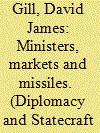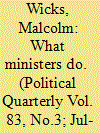|
|
|
Sort Order |
|
|
|
Items / Page
|
|
|
|
|
|
|
| Srl | Item |
| 1 |
ID:
096262


|
|
|
|
|
| Publication |
2010.
|
| Summary/Abstract |
Governance structures in central government departments are poorly articulated. Departmental boards were imported from the private sector; in central government their remit and accountability are obscure, as is their role in relation to Permanent Secretaries and Ministers-whose leadership roles are also muddled. This brings costs for Ministers, departments and the public. Improvements have proved elusive, in part because an underlying confusion has been neglected-about how bodies subject to the almost unlimited democratic accountability of Ministers are to be governed. The confusion can be cleared up, principles of governance formulated, and concrete improvements proposed. These include: better articulation of Permanent Secretaries' presumptive leadership role; strengthened lines of external accountability; and more coherent provisions for the role and accountabilities of boards, and their relationship with Ministers, Permanent Secretaries, and the centre of government. Such changes should improve accountability, leadership, capability and delivery.
|
|
|
|
|
|
|
|
|
|
|
|
|
|
|
|
| 2 |
ID:
180218


|
|
|
|
|
| Summary/Abstract |
Half a year after rising to the position of prime minister in Ethiopia, Abiy Ahmed appointed a cabinet that included an unprecedented 50% women, including the first female minister of defense. This was noteworthy, because women had not been well-represented in Ethiopian political leadership. What motivated the appointment of so many women? We argue that the selection of ministers in aid-dependent global south countries responds to external cues—and that this leads to more women in the cabinet. Our findings regarding Ethiopia’s 50% female cabinet suggest that the role of external cues in cabinet selection deserves further investigation.
|
|
|
|
|
|
|
|
|
|
|
|
|
|
|
|
| 3 |
ID:
102649


|
|
|
|
|
| Publication |
New Delhi, Lok Sabha Secretariat, 2004.
|
| Description |
vii, 193p.
|
|
|
|
|
|
|
|
|
|
|
|
Copies: C:1/I:0,R:1,Q:0
Circulation
| Accession# | Call# | Current Location | Status | Policy | Location |
| 055672 | 328.33025/IND 055672 | Main | On Shelf | Reference books | |
|
|
|
|
| 4 |
ID:
099061


|
|
|
|
|
| Publication |
2010.
|
| Summary/Abstract |
Existing accounts of British efforts to achieve a nuclear non-proliferation treaty between 1964 and 1968 largely overlook the later stages of decision making within the Labour government. Scrutiny of previously classified sources reveals that a desire for entry into the European Economic Community had a much larger influence on the content and conduct of British non-proliferation policy than previously suggested. By 1967, Prime Minister Harold Wilson sought a secondary role in treaty negotiations, and left the running to the superpowers. This avoided unnecessary conflict with the countries of the Community, resentful of the Treaty's discriminatory terms, and helped to protect Britain's application to join the EEC. Although this bid was unsuccessful, ambitions for future membership continued to influence non-proliferation policy in 1968. Indeed, a desire for future entry into the EEC helps to explain why Britain became the first nuclear weapon state to ratify the Treaty.
|
|
|
|
|
|
|
|
|
|
|
|
|
|
|
|
| 5 |
ID:
092396


|
|
|
|
|
| Publication |
2009.
|
| Summary/Abstract |
There is a range of evidence pointing to the problem of overload on government ministers in both the UK and other Westminster-system countries. This article reviews evidence from the time of Gladstone to the present day, concentrating on evidence relating to the last twenty five years. It surveys the comments and opinions of serving and retired politicians and of academic commentators, assessing the contention that the burden on ministers has increased, is likely to continue to increase, and ought to be diminished. It goes on to look at what have been put forward as potential solutions and explores the extent to which they might offer some respite. Finally, the article concludes that the remedy to the problems involved largely lies in the hands of ministers and their closest advisers, and suggests that it is in all our interests that options to reduce overload should be further explored and implemented.
|
|
|
|
|
|
|
|
|
|
|
|
|
|
|
|
| 6 |
ID:
117497


|
|
|
|
|
| Publication |
2012.
|
| Summary/Abstract |
Having been a minister in three different departments for a period of over nine years (1999-2008), during the Blair and, briefly, the Brown governments, I thought it might be useful to reflect on what ministers actually do, their functions and how they spend their days. In thinking about what I did as a minister, I have avoided going back to some of the classic constitutional texts on what ministers supposedly do, how they are accountable and such like. I am sure there is good literature on this from political scientists and constitutionalists, but I have avoided influencing my own views and approach by consulting these texts.
|
|
|
|
|
|
|
|
|
|
|
|
|
|
|
|
|
|
|
|
|